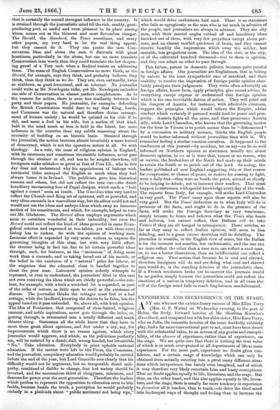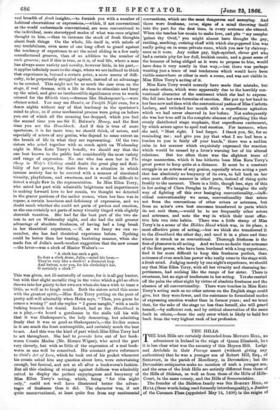EXPERIENCE AND INEXPERIENCE ON THE STAGE. A NY one who
saw the extraordinary success of Miss Ellen Terry 11 (Mrs. G. F. Watts) on Wednesday evening, in the part of Helen, the lively, forward heroine of Mr. Sheridan Knowles's Hunchback, and compared her with her abler sister, Miss Kate Terry, who as Julia, the romantic heroine of the same decidedly rubbishy play, had a far more conventional part to act, must have been struck with the substantial value, to an actress of any genius and suscepti- bility, of the absence of experience, rather than of experience, on the stage. We are quite sure that there is nothing the true value of which is so much over-praised in all departments of life as mere experience. For the most part, experience no doubt gives con- fidence, and a certain range of knowledge which can only be obtained from actually entering into a great many different situa- tions which inexperience has barely even imagined, and of which it may therefore very likely entertain false and hasty conceptions. That no doubt applies equally to life, literature, and the stage. But then, on the other hand, and this also applies equally to life, litera- ture, and the stage, there is usually far more tendency in experience to formulate all it teaches, than to teach,—to drive the tired mind into hackneyed ways of thought and feeling than to increase the
real breadth of fresh insights,—to furnish you with a number of habitual observations or expressions,—which, if not conventional as the world understands conventional, are soon conventional to the individual, mere stereotyped modes of what was once original thought in him, —than to increase the stock of fresh thoughts about fresh things. On the whole, life itself is, with minds of any truthfulness, even more of one long effort to guard against the tendency of experience to set the mind sliding in a few early manufactured grooves, than of an addition to the number of such grooves ; and if this is true, as it is, of real life, where a man has always some variety and novelty, however little, in his part,— it applies infinitely more to the stage, where we are inclined to think that experience is, beyond a certain point, a mere source of diffi- culty, to be perpetually struggled against, instead of an advantage to be coveted. This might not be so much the case even on the stage, if real dramas, with a life in them to stimulate and buoy up the mind, and give an inexhaustible significance even to words uttered for the fiftieth time,—dramas like Shakespeare's,—were oftener acted. You may see Hamlet, or Twelfth Night even, for a dozen nights without any of that tendency in the spectator's mind to glaze, as if some mechanical process were going on before you out of which all the meaning has dropped, which you feel the second time you see Sir E. Bulwer's Money, and the first time you see the Hunchback. And if this is true of mere spectators, it is far more true, we should think, of actors, and especially of actors of any genius, who depend to some extent on the breath of life in what they are representing. Of the two sisters who acted together with so much spirit on Wednesday night in Miss Kate Terry's benefit, we should say that the one best known to the public had considerably the most variety and range of expression. No one who has seen her in The Sheep in Wolis Clothing could doubt the great play and flexi- bility of her power, for there there is a situation in which intense anxiety has to be covered with a manner of simulated vivacity, playfulness, and sweetness, and it would be difficult to detect a single flaw in the representation. In Miss Ellen Terry, who acted her part with admirable brightness and impertinence in making forward love to her cousin, we thought we detected in the graver portions of the earlier scenes, when her face was in repose, a certain heaviness and deficiency of expression, and we doubt much whether she could act parts of pathos and emotion, as she can certainly act parts of saucy vivacity tinged with slightly shrewish vexation. She had far the best part of the two sis- ters to act on Wednesday night, and she had the still greater
advantage of absolute freshness, of having had a long break in her theatrical experience, — if, as we fancy we can re-
member, she has had theatrical experience before. Npthing could be better than her teazing, bantering manner, when she made fun of Julia's mock-modest suggestion that the new comer —the lover—was a clerk of Master Walter's :—
"A clerk has such a gait.
So does a clerk dress, Julia,—mind his hose,— They're very like a clerk's! a diamond loop And button, note you, for his clerkship's hat, 0 certainly a clerk !"
This was given, not ill-naturedly of course, for it is all gay banter, but with that slight metallic ring in the voice which a girl so often throws into her gaiety to her own sex when she has a wish to tease a little, as well as to laugh much. Both the sisters acted this scene with the greatest spirit,—Miss Kate Terry putting on the pout of pretty self-will admirably when Helen says, "Then, you guess he comes a wooing ?" and she replies "I guess naught," with a smile lurking beneath her denial. Indeed, bad as the Hunchback is as a play,—aie heard a gentleman in the stalls tell his wife that it was Shakespeare's, the lady demurring, but admitting freely that it was as good as Shakespeare's,—the livelier scenes in it are much the least contemptible, and certainly much the best to act. And this was the kind of part which Miss Ellen Terry had to act throughout. She had to provoke love out of her book- worm Cousin Modus (Mr. Horace Wigan), who acted the part very cleverly, but with as little of the expression of a real book- worm as can well be conceived. His constant grave references to Ovid's Art of Love, which he took out of his pocket whenever his cousin asked him any question about love, were entertaining enough, but farcical, and not at all after a bookworm's fashion. But all this clashing of vivacity against dullness was admirably suited to display the perfect enjoyingness and buoyancy of Miss Ellen Terry's acting, which, being "for this night only," could not well have illustrated better the advan- tages of freshness than it did. The character was, if not quite unconventional, at least quite free from any sentimental conventions, which are the most dangerous and annoying. And there were freshness, verve, signs of a mind throwing itself into the part for the first time, in every sentence she uttered. When she teaches her cousin to make love, and pits "my sampler 'gainst thy Ovid," you might almost have thought the gay, rattling, mocking, enticing chaff with which she peppered him was really going on in some private room, which you saw by clairvoy- ance as it were. Any rather gay, high-spirited, clever girl who had a certain pity for her dull, bookish cousin, and a great sense of the humour of being obliged as it were to propose to him, would have done it very nearly in that way,—but there was perhaps wanting just a trace of real tenderness which would have been visible somewhere or other in such a scene, and was not visible in Miss Ellen Terry's acting of it.
Miss Kate Terry would scarcely have made that mistake, but she made others, which were apparently due to the horribly con- ventional character of the sentiment which she had to express. She fell into her own formulas of emotion. She put up her hand to her face now and then with the conventional pathos of Mies Carlotta Leclerq, and twitched her mouth with a superfluous agitation which we had never observed in her before. Not unfrequently she VMS her tree self in the complete absence of anything like that evenly distributed stage emphasis, that superfluous excitement, by which actors agree to spoil real emotion. For instance, when she said, "Most right. I had forgot. I thank yon, Sir, for so reminding me ; and give you joy that what I see had been a burden to you is fairly off your hands," there was a sudden calm in her manner which exquisitely expressed the reaction which would be caused by a lover's warning her of his altered relations. But too often there was the slightest trace of stage mannerism, which it has hitherto been Miss Kate Terry's great power to keep quite at a distance. It must be a constant struggle in an actress of any genius, especially when acting a part that has absolutely no buoyancy of its own, to fall back on her own most effective manner in other parts, instead of rising quite freshly to the moment. There is a little, though leas, sign of this in her acting of Clara Douglas in Money. We imagine the only way of fighting off this ever besieging conventionality,—indi- vidual conventionality we mean, conventionality that arises not from the conventions of other actors or actresses, but from an actor's own best successes transferred to parts which do not suit them,—would be to see frequently other actors and actresses, and note the way in which their most effec- tive hits run into habits. There was a little stamp of Miss Terry's in a scene of the Hidden Hand which was, in its place, a most effective piece of acting,—but we think she transferred it to the Hunchback the other day, and used it in a place and time where it struck us as conventional. Thorough freshness is the first of pleasures in all acting. And we have no doubt that actresses of the first power, who have been burdened with a long experience, find it far more difficult to keep this freshness perfect, than actresses of even much less power who really come to the stage with a fresh mind. Judging merely by one night's experience, we should say that Mist Ellen Terry, with all her vivacity and charming im- pertinence, had nothing like the range of her sister. There is sweetness, but no sign of tenderness in her acting. Yet she carried off the palm the other night by virtue of absolute freshness and the absence of all conventionality. There were touches in Miss Kate
Terry's acting such as no other actress on the English stage could give, but they were fewer, and the resistance to formulated modes of expressing emotion weaker than in former years ; and we trust that, for the sake of the stage no less than herself, she will guard herself,—by sufficient rest, and by critical observation of the same fault in others,—from the only error which is likely to hold her back from the very highest rank of her profession.































 Previous page
Previous page